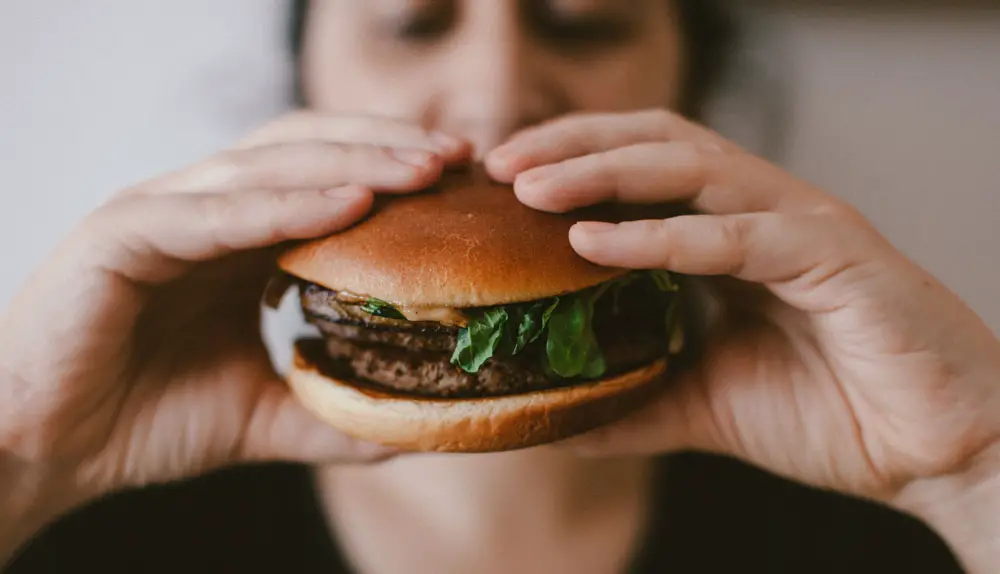It was another restless night for James. He tossed and turned, struggling with a feeling of guilt and shame that had become all too familiar.
Earlier that evening, he had once again succumbed to the temptation of gluttony – mindlessly devouring an entire pizza, followed by a pint of ice cream, leaving him feeling sluggish and remorseful.
As the first rays of sunlight peeked through the curtains, James reluctantly dragged himself out of bed, his mind racing with thoughts of how to stop eating in such a gluttonous manner.
He knew that this behavior was not only detrimental to his physical health but also a sin that went against his Christian beliefs.
James had been raised in a devout household, where the teachings of the Bible were deeply ingrained.
He remembered the passages that warned against the dangers of gluttony, likening it to idolatry – the act of placing one’s desires above the worship of God.
“So put to death the sinful, earthly things lurking within you. Have nothing to do with sexual immorality, impurity, lust, and evil desires. Don’t be greedy, for a greedy person is an idolater, worshiping the things of this world.”
Colossians 3:5 (NLT)
biblegateway.com
Yet, despite his best efforts, James found himself trapped in a vicious cycle of overindulgence and self-loathing.
The cravings were relentless, and the temptation to succumb to his gluttonous habits seemed insurmountable.
As he made his way to the kitchen, James resolved to seek guidance from the very source that had shaped his values – the Bible.
He knew that within its pages lay the answers he so desperately sought, a path towards self-control, moderation, and the ability to honor God with his actions.
What is Gluttony According to the Bible?

Gluttony is defined as overindulgence and excess when it comes to food, drink, or appetite.
The Book of Proverbs refers to gluttony this way:
“For the drunkard and the glutton will come to poverty, and drowsiness will clothe a man with rags.”
Proverbs 23:21 (NKJV)
biblegateway.com
Essentially, gluttony is making food and eating an obsession. It’s allowing your desires to control you rather than being master over them through God’s power.
Gluttony can manifest through behaviors like:
- Eating well past the point of feeling full.
- Constantly craving more food.
- Making food the comfort and focus instead of Jesus.
- Never feeling satisfied, no matter how much you eat.
- Eating for emotional reasons rather than physical hunger.
In Philippians 3:19 (NIV), the Bible associates gluttony with destruction:
“Their destiny is destruction, their god is their stomach, and their glory is in their shame. Their mind is set on earthly things.”
biblegateway.com
When you live for food instead of eternal things, the belly becomes an idol. And as 1 Corinthians 6:13 reminds us, food is meant to serve us – we are not meant to serve it.
“Food is for the stomach and the stomach for food, but God will do away with both of them…”
biblegateway.com
Why is Gluttony Sinful?

Gluttony is considered a sin for several reasons, according to Scripture:
- It makes food an idol in place of God. Eating becomes about satisfying fleshly desires rather than fueling the body (Philippians 3:19).
- It shows a lack of self-control. God calls us to be masters over earthly desires, not slaves to them through our lack of restraint (2 Peter 1:5-6).
- It wastes resources. Overindulgence in food or drink can drain finances that could be used to further God’s kingdom (Proverbs 23:20-21).
- It invites other sins. Gluttony is associated biblically with tendencies like stubbornness, rebellion, laziness, and drunkenness (Deuteronomy 21:20).
- It harms the body. Overeating to the point of obesity damages the body, which scripture says is the temple of the Holy Spirit (1 Corinthians 3:16-17).
Gluttony is not just a bad habit but a sin that hurts your relationship with God and others. That’s why overcoming it is essential.
Signs You May Be Struggling with Food Addiction

Since gluttony is an addiction, it’s helpful to identify signs that it may be taking hold:
- You frequently overeat even when full or not hungry.
- Certain foods control you rather than you controlling your intake.
- You eat to cope with stress, anxiety, sadness, or boredom.
- Your eating patterns feel out of control.
- You obsess about food and plan binges.
- You isolate yourself to overeat or hide it from others.
- You feel powerless to stop cravings and urges to eat.
If one or more of these resonate with you, it may signal food addiction. But by God’s power, you can overcome. Let’s explore how.
5 Steps to Overcome Gluttony from a Christian Perspective

Defeating the sin of gluttony begins by coming to God in repentance and asking for the Holy Spirit’s help in gaining self-control.
Here are 5 biblical steps to break free:
1. Fast and pray
Fasting is a form of self-denial that helps strengthen your spirit’s authority over the desires of the body.
Jesus fasted while being tempted in the wilderness (Matthew 4:1-11). Fasting brings clarity and helps you focus on God to receive his wisdom and strategy.
2. Limit portions and frequency
Monitor your portions, and do not continually snack or indulge your cravings.
Proverbs 25:16 states, “If you find honey, eat just enough.” Identify triggers and use moderation.
3. Fill up on healthy foods
Choose fiber-rich fruits, veggies, whole grains, and lean proteins. They nourish the body while keeping blood sugar stable, so you avoid cravings.
4. Submit cravings to God
Bring urges to overeat to God immediately and ask the Holy Spirit for self-control. Say “No!” firmly to the temptation, as Jesus modeled when facing Satan.
5. Find fulfillment in Christ
Ultimately, gluttony happens when we try to satisfy spiritual needs with food. Come to Jesus daily to fulfill your innermost needs and seek first His kingdom.
Along with these steps, keep a food journal to increase awareness of your eating habits and to prompt healthier choices.
Find an accountability partner who will pray with you and keep you on track to overcome. And don’t forget to move your body; exercise boosts energy and mental health.
Why Do People Struggle with Gluttony?

What causes gluttony to take root in the first place?
Here are some common reasons according to health experts and ex-food addicts:
- Childhood habits around emotional eating.
- Food becomes a coping mechanism for stress and trauma.
- Dopamine released when eating highly palatable foods can be addictive.
- Low self-esteem or lack of purpose leads to “numbing out” with food.
- Underlying biological factors like leptin resistance or impaired satiety signals.
- Exposure to food marketing and constant availability normalizes overeating.
But at its core, gluttony springs from spiritual deficits—seeking comfort and fulfillment from creation rather than the Creator.
Bringing that to light is the first step in breaking free.
Bible Verses About Gluttony and Self-Control

Scripture gives us many warnings about gluttony as well as advice for mastering self-control and appetite. Some key verses include:
“Put a knife to your throat if you are given to gluttony.”
Proverbs 23:2 (NIV)
biblegateway.com
“19 Do you not know that your bodies are temples of the Holy Spirit, who is in you, whom you have received from God? You are not your own; 20 you were bought at a price. Therefore honor God with your bodies.”
1 Corinthians 6:19-20 (NIV)
biblegateway.com
“For we know that our old self was crucified with him so that the body ruled by sin might be done away with, that we should no longer be slaves to sin.”
Romans 6:6 (NIV)
biblegateway.com
“No discipline seems pleasant at the time, but painful. Later on, however, it produces a harvest of righteousness and peace for those who have been trained by it.”
Hebrews 12:11 (NIV)
biblegateway.com
“5 For this very reason, make every effort to add to your faith goodness; and to goodness, knowledge; 6 and to knowledge, self-control; and to self-control, perseverance; and to perseverance, godliness.”
2 Peter 1:5-6 (NIV)
biblegateway.com
Breaking Free from Gluttony for Good

Conquering the sin of gluttony requires diligence and daily choices to reject fleshly urges and do God’s will. But through the power of Christ, you can see lasting change.
Here are some keys:
- Keep your eyes on Jesus: Stay rooted in prayer, and scripture to receive the Holy Spirit’s strength.
- Equip yourself with truth: Study biblical wisdom and counsel from those who’ve overcome food addiction.
- Accept imperfection: Don’t beat yourself up over slip-ups. Repent and keep moving forward in humility.
- Make wise lifestyle choices: Limit exposure to temptation, manage stress, and practice self-care.
- Pursue wholeness: Deal with root issues fueling addiction, like trauma or emotional deficiencies.
God is gracious and faithful. He wants to help you find freedom!
It won’t happen overnight, but by surrendering your weaknesses to Christ every day, you will walk in consistent victory over gluttony. And that will bring immense blessing to all areas of life.
Key Takeaways to Overcome Gluttony
- Gluttony is a dangerous addiction. It makes food an idol in place of God but with Christ’s power, you can overcome.
- Identify root causes, like emotional eating or biological factors, so you can target them.
- Take practical steps like fasting, limiting portions, choosing healthy foods, exercising self-control, and seeking first God’s kingdom.
- God offers full forgiveness as you turn from gluttony and seek empowerment through the Holy Spirit.
- With a consistent focus on renewing your mindset and lifestyle, you will experience freedom and victory for good!
Conclusion
Friend, God loves you dearly and wants to help you conquer the bondage of food addiction and gluttony. You have so much purpose ahead!
By leaning on Christ daily and taking proactive steps of faith, you will find wholeness, discipline, and abundant life. May God richly bless you on the journey to freedom.
Frequently Asked Questions About Overcoming Gluttony
Q. Why can’t I stop overeating even though I want to change?
A. Long-term habits wired in your brain and body can make gluttony feel beyond your control.
Keep seeking help from God, doctors, coaches, or counseling to gain self-mastery. Change is possible with time and support!
Q. I’m so ashamed about my gluttony. Can God really forgive me?
A. Yes! Scripture says in 1 John 1:9 that if we confess our sins, God is faithful to forgive us and cleanse us from all unrighteousness. God loves you very much as His child.
Q. How can I make healthy eating sustainable long-term?
A. Make gradual changes, focus on adopting new skills versus just losing weight, get accountability, address emotional issues, and give yourself grace on the journey. God will give you the strength you need!
Q. Why does it seem I lack self-control in every area, not just food?
A. Getting to the root causes with a counselor can help. Often we have underlying mental health issues, trauma, or lack the life skills that fuel multiple struggles. Ask God for wisdom.
Q. How do I forgive myself and move forward when I fail in this area?
A. The key is to humbly repent but not get stuck in regret. Let go of past mistakes, receive God’s forgiveness, and refocus on making the next wise choice. Progress, not perfection!





